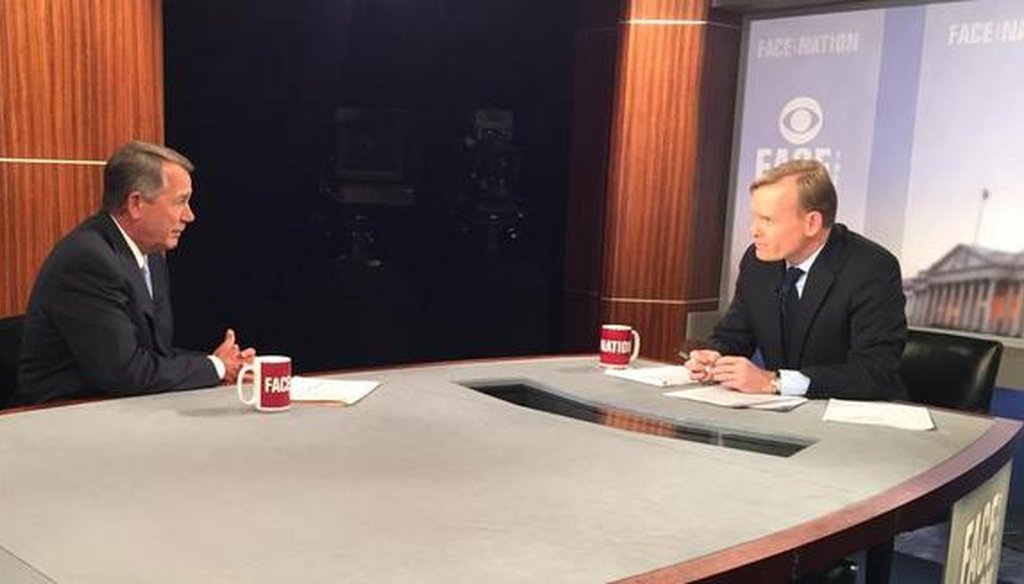



House Speaker John Boehner, R-Ohio, appeared on "Face the Nation" March 1, 2015. (CBS)
In making the case that President Barack Obama overstepped his bounds on immigration, House Speaker John Boehner pointed to another sore spot: Obamacare.
"It’s the president of the United States overreaching, and that’s just not on immigration. You know 38 times he made unilateral changes to Obamacare," Boehner said on CBS’ Face the Nation March 1. "Many of these, I believe, far beyond his constitutional authority to do so."
PolitiFact looked into a similar claim about Obama’s actions on the Affordable Care Act in 2013, when Rep. Tom Graves, R-Ga., said Obama had made 19 changes to the health care legislation since it became law in 2010. We rated that claim Half True.
So we wondered where Boehner got the 38 "unilateral changes" figure.
Boehner’s staff pointed us to the Galen Institute, a think tank that promotes free-market principles in health care. A Feb. 25 article lists 48 changes to the Affordable Care Act, but they aren’t all unilateral -- meaning that weren’t made by the Obama administration without the input of the other branches of government. The Galen Institute’s list includes:
Two changes because of Supreme Court decisions;
17 changes as the result of congressional action;
29 changes by the Obama administration.
Among the unilateral actions by the administration, according to Galen: delays on insurance provider transparency requirements, choosing which mandates apply to U.S. territories, and delaying the policy sign-up deadline.
Galen Institute President Grace-Marie Turner told PolitiFact that the think tank will soon update its unilateral action count to 30, with the administration’s recent decision to reduce cost-sharing. The law originally called for out-of-pocket maximums to be lowered for those between 100 percent and 400 percent of the federal poverty level, but the administration changed this provision to only apply to those between 100 and 250 percent of the poverty level.
She added that the administration repeated three of the unilateral actions, bringing the count up to 33.
And an August 2014 report by the Congressional Research Service, a nonpartisan government program, included five additional examples. All of these combined adds up to 38, Turner said.
It’s worth noting, though, that the Congressional Research Service report does not count every single administrative change to the Affordable Care Act. Instead, it selectively chose the "more significant actions that have been the subject of debate among health policy analysts and, in some instances, the target of criticism by opponents of the ACA."
So according to the report, there have been 12 significant "delays, extensions" or "other actions taken by the administration."
The report says that the most controversial action has been the 2013 decision to delay enforcement of the employer mandate -- the requirement that employers with 50 or more employees must offer full-time workers affordable health insurance or pay a penalty -- to 2015.
Larry Jacobs, chair of political studies at the University of Minnesota, said that in addition to the employer mandate delay, the most significant actions have been abandoning the long-term care program (CLASS) and the small employer program (SHOP).
Of Galen’s more comprehensive list, most are technical changes, rather than policy changes, said James Thurber, director of American University’s Center for Congressional and Presidential Studies.
"Most are insignificant administrative actions by (Health and Human Services)," Thurber wrote in an email to PolitiFact. "This is common under all presidents."
Our previous fact-check on this subject noted that Medicare Part D, the prescription drug benefit passed under President George W. Bush, was changed several times after its initial passage.
For example, the Bush administration chose to extend the deadline and waive penalty fees for Medicare Part D enrollees.
"Presidents always use administration to find feasible, workable paths and to work their agenda," Jacobs said. "Since Nixon and then Reagan, an ‘administrative presidency’ has emerged where presidents use their large administrative staff, agencies and departments to work their way."
Our ruling
Boehner said Obama made "unilateral changes" to Obamacare "38 times."
Boehner’s staff sent us a link to 29 unilateral actions, and it takes some creative picking and choosing to get the count up to 38 -- including counting two delays of the same regulation as separate actions. Further, the Congressional Research Service only considers 12 of these actions to be significant policy changes.
Lastly, experts said administrative changes are a routine part of the lawmaking process and have occurred "under all presidents."
Boehner’s claim is partially accurate but leaves out important details. We rate it Half True.
CBS, Face the Nation, March 1, 2015
Galen Institute, "48 Changes to Obamacare So Far," Feb. 25, 2015
Congressional Research Service, "Implementing the Affordable Care Act: Delays, Extensions, and Other Actions Taken by the Administration," Aug. 1, 2014
PolitiFact, "Tom Graves says Obama has changed the Affordable Care Act 19 times," Sept. 25, 2013
Email interview, Boehner spokesperson Michael Steel, March 1, 2015
Email interview White House spokesperson Jesse Lee, March 1, 2015
Email interview, Galen Institute President Grace-Marie Turner, March 1, 2015
Email interview, American University professor James Thurber, March 1, 2015
Email interview, University of Minnesota professor Larry Jacobs, March 1, 2015
In a world of wild talk and fake news, help us stand up for the facts.
